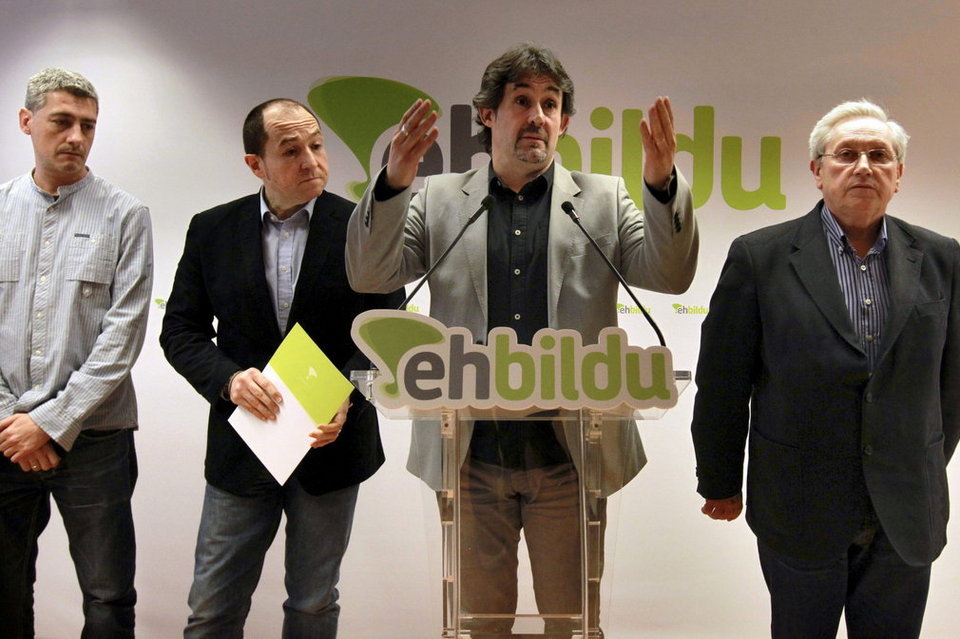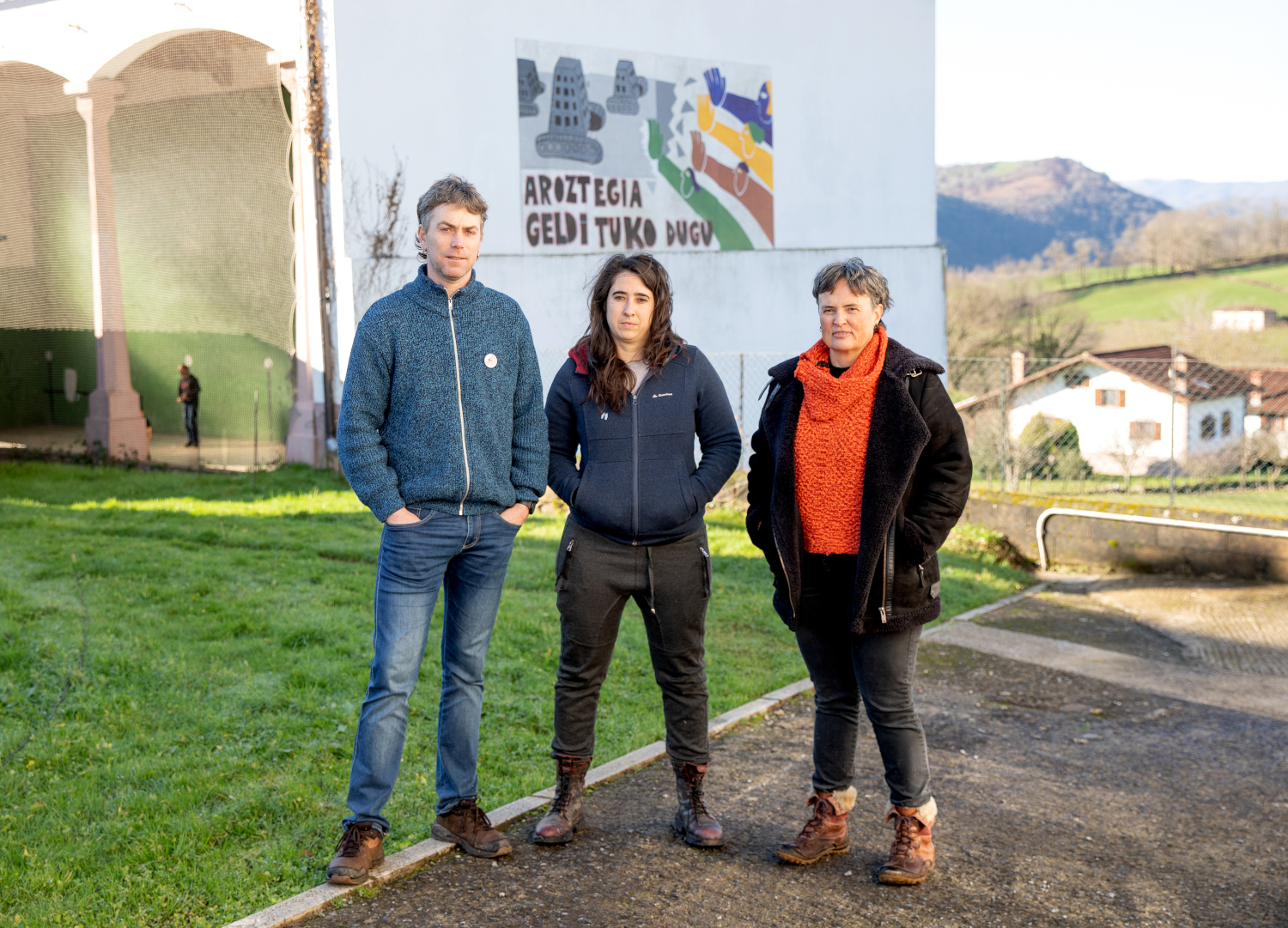Adapt to society or transform from the bottom up?
- Despite the support of 300,000 people, the elections have exposed the borders of EH Bildu. Is precipitation the main cause of the fall? Is it Vocento's attack? Is this a structural concern or a cyclical situation? From the point of view of popular movements, the analysis of the theme is shown below.

In the field of leftist independentists, important developments have taken place in the last four years: 50 years later, the end of the armed struggle; the legalization of the Abertzale left; the coalition with EA, Alternatiba and Aralar; the need to act according to the undemocratic norms of the “contaminated” lists; the management of the greatest institutional power it has ever had; the need to endure without interruption the wheel of political judgments.. It has been a situation that has been able to profoundly influence any political force, and it certainly has had a direct influence on political analysis and activity.
At the same time, the borders of traditional political parties are becoming more visible than ever around the world. The conviction that the so-called ‘democratic game’ dependent on the parties has little democratic and a lot of play has been taken over by a large group of citizens. In our case, perhaps conditioned by the characteristics of the policy here, the Abertzale left has not managed to connect in general with those who said that “they do not represent us”. Many have felt that the Abertzale left has acted more as a party than ever before in view of the need to adopt other forms of politics in the Basque Country. In an attempt to give an image of normality and good manager, EH Bildu has been placed in the same scheme as the other political parties.
This decision has had profound consequences: not wanting to overcome the limits of the politically correct, avoiding confrontation between projects, not dissociating oneself from the model of the other parties in the terminology and communication strategy used, not making new contributions in the field of forms of struggle...
On this subject, political scientist Asier Blas said in Hamaika Telebista: “The left profile has remained in the background, with the PNV as progrí, EH Bildu has diluted its identity. He has entered the ideological sale.” Also in the independence character, they have given centrality to the right to decide. More than one has accused the coalition of not going far enough into the ideological pedagogy that independence needs to win new areas.
In this flood, EH Bildu has replaced the message of the social bases of Sortu and Alternatiba, which have a clear left profile. The coalition’s plain political message does not satisfy many of the most active in popular construction. Many militants of the popular movement are noted for the indifference and lack of illusion by the political parties.
Historically, in the message and in the social base of the Abertzale left, the commitment to organized citizenship, the ferocious criticism of the system of political representation and of traditional parties, and the disobedient attitude towards the impositions have been common. These are ideas that have been imposed in the new popular movements that have taken place in many parts of the world today. A more rigorous reading of these new social phenomena can allow EH Bildu to channel the feeling of distancing many sectors of society towards old politics, linking itself to a clear independence alternative against capitalism. The clash between the new policy and the old policy, fed by a clear message from the Left, is a variable to be taken into account.
There is the possibility of creating complicity with other working-class people who have not been accompanied for years by leftist independentists. The challenge of the Abertzale Left is not to miss a unique opportunity to overcome the sterile Basque Spanish dichotomy, promote popular identity and create new relationships between those who are "down". In line with what Sortu President Hasier Arraiz said in Berria, “EH Bildu has to be polyhedral.” In the area, analyses and proposals of the area could be created and developed, as evidenced by the fact that Tudela is in favour of a citizen. The revision of the organizational model can be one of the first steps.
This new group of people who feel the generalized boredom to the political and economic system has been absorbed by Podemos, mainly in the CAV. These citizens have not seen proper representation both on the Abertzale left and on EH Bildu. We have an example of this in the area of Bilbao, where one third of the Basque Country is concentrated. In a region with the worst parameters of poverty and precariousness throughout the Basque Country, the Basque right – and abstention – has won, EH Bildu has gone down in the vote and Podemos has entered as a second force in most peoples. The PNV has not given up "accumulating forces" in the context of those who have the same values in the Basque Country. The results of these elections have made it very clear that much of the votes lost by pp and PSOE have been for the PNV, which has achieved spaces of power without control in the four provinces of Hego Euskal Herria.

president of the Sortu, Hasier Arraiz, pointed out in Euskadi Irratia
the lack
of smell to know what the citizens wanted about the evaluation of the elections.
In Gipuzkoa, the Abertzale left has managed for the first time the Guipuzkoan capital and the Provincial Council of Gipuzkoa. In the face of any relevant measure, decision or declaration, we have seen for four years joint responses from the opposition, private control media and big business. The issue of waste has been one of the stars. In addition to the mistakes that EH Bildu has made, the offensive of the factual forces defending a conservative Gipuzkoa has been particularly relevant. EH Bildu has been aided in today's elections, in most peoples, only in those who have managed to create a strong popular movement. Any party or institution will hardly be able to sustain a storm of this size without a job an ant of awareness of the local, organized and critical population.
Institutions and transformation
Are institutions spaces for the management of a political project of their own or tools to generate popular power? The tension between these two positions to understand politics has been long-standing.
The traditional values of today’s society can be seen as a ceiling or limit. However, the lack of demand or concealment of the values of the transformative project transmits weakness and lack of confidence, not forgetting the fears or complexes it can generate when trying to put it into practice. However, the deepening of the values, in addition to giving coherence to the project, entails the activation of the people that make up the transformative subject and, therefore, the results.
Institutions and politics in general can be a tool to activate citizenship, organize it, and accelerate the processes of empowerment from the bottom to the top. That is, that citizenship is at the forefront of change is the key.
Anna Gabriel Sabaté, a member of the Cup who has tripled her institutional representation in the last elections, presented this vision in ARGIA: "Institutional representation has to be a reflection of the popular movement, and not the other way around, of who we are. We represent the people organized in the institutions."
Institutional representation based on political parties is a way of making outdated policy for many people around the world. It is not the right system for a few people to be given every four years the power to decide the accounts for all citizens. Because, in addition to the lack of control over politicians, votes do not control the other points of power of society, such as multinationals and the mass media. It is therefore appropriate to do so with special rigour when looking at Navarre, which has become synonymous with "change". An essential step has been taken in Navarre: to eradicate the political caste of a power centre. However, without the control of the bottom-up movements generated by critical citizenship, real change is going to be distant, as far as the transformation of the values of society is concerned. As has been seen in Gipuzkoa and Greece, achieving instutive power is not enough to bring about profound changes.
Therefore, EH Bildu will have to answer a fundamental question: What do you want to be in the future, the movement that you want to feed with the collective wisdom of the different popular movements in Euskal Herria or the sum of the compact structures of the traditional parties?
Fostering debate on the organisational model may imply a strengthening of the colectivo.La horizontalization of structures can be a way of dealing with the lack of involvement and illusion that can be detected today. Distributing power, promoting generational change and making fundamental decisions by militants and bases are some of the important keys.
Ilbeltzeko igande goiz batez jo dugu Baztanera. Eguzkiak oraindik ez du Lekarozko plaza argitu; bertan elkartu gara Garbiñe Elizegi Narbarte, Itziar Torres Letona eta Ernesto Prat Urzainkirekin. Itzaletan hotz egiten du eta umorez goxatu dugu lehen agurra, hogei urtean... [+]
Nafarroako Ahal Duguko bozeramaile ohiak bere kontra abiatutako prozesua salatu, eta aldaketa arriskuan ez dagoela azpimarratu du.
Eremu mistoko hainbat herritan egingo dute kanpaina. Herritarrak instituzioei zonifikazioarekin amaitzeko eskabidea egitera bultzatu nahi dituzte.
Nafarroako Parlamentuko Bozeramaileen Batzordeak ferietako liskarragatik auzipetutako gazteen kontra fiskaltzak egindako zigor eskaeren aurka egin du.






















